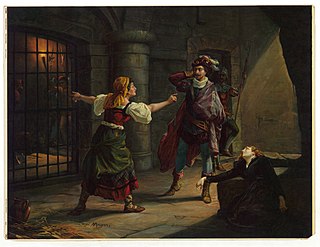
Il trovatore is an opera in four acts by Giuseppe Verdi to an Italian libretto largely written by Salvadore Cammarano, based on the Spanish play El trovador (1836) by Antonio García Gutiérrez. It was García Gutiérrez's most successful play, one which Verdi scholar Julian Budden describes as "a high flown, sprawling melodrama flamboyantly defiant of the Aristotelian unities, packed with all manner of fantastic and bizarre incident."
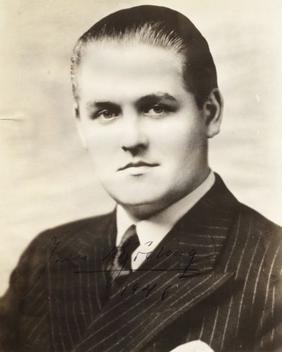
Johan Jonatan "Jussi" Björling was a Swedish tenor. One of the leading operatic singers of the 20th century, Björling appeared for many years at the Metropolitan Opera in New York City and less frequently at the major European opera houses, including the Royal Opera House in London and La Scala in Milan. He sang the Italian, French and Russian opera repertory with taste.

Berliner Gramophone – its discs identified with an etched-in "E. Berliner's Gramophone" as the logo – was the first disc record label in the world. Its records were played on Emile Berliner's invention, the Gramophone, which competed with the wax cylinder–playing phonographs that were more common in the 1890s and could record.
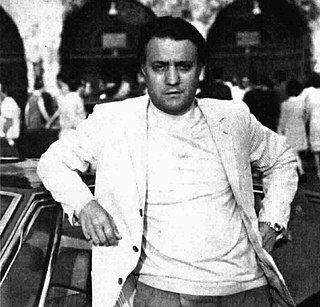
Piero Cappuccilli was an Italian operatic baritone. Best known for his interpretations of Verdi roles, he was widely regarded as one of the finest Italian baritones of the second half of the 20th century. He was enormously admired within the field of opera for his rich and abundant voice, fine vocal technique and exceptional breath control. In the great Italian tradition he fused words and music into elegant phrases. He focused on Italian repertory, particularly the operas of Verdi, singing 17 major roles.

Salvatore Licitra was an Italian operatic tenor.
"Funiculì, Funiculà" is a Neapolitan song composed in 1880 by Luigi Denza to lyrics by Peppino Turco. It was written to commemorate the opening of the first funicular railway on Mount Vesuvius. It was presented by Turco and Denza at the Piedigrotta festival the same year. The sheet music was published by Ricordi and sold over a million copies within a year. Since its publication, it has been widely adapted and recorded.
Franco Bonisolli was an Italian operatic tenor, particularly associated with the Italian repertory, notably as Manrico and Calaf.

Herva Nelli was an Italian and American operatic soprano.
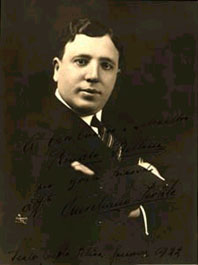
Aureliano Pertile was an Italian lyric tenor. Many critics consider him one of the most exciting operatic artists of the inter-war period, and one of the most important tenors of the 20th century.

Joan Pons Álvarez is a Spanish operatic baritone, known internationally as Juan Pons. He is most famous for his Verdi roles.

Rolando Panerai was an Italian baritone, particularly associated with the Italian repertoire. He performed at La Scala in Milan, often alongside Maria Callas and Giuseppe Di Stefano. He was known for musical understanding, excellent diction and versatile acting in both drama and comic opera. Among his signature roles were Ford in Verdi's Falstaff and the title role of Puccini's Gianni Schicchi.
Renato Cellini was an Italian opera conductor. His father was Ezio Cellini, who was a stage director who worked with Arturo Toscanini.
Aldo Protti was an Italian baritone opera singer, particularly associated with the Italian repertory. He was particularly appreciated in Verdi roles, especially Rigoletto, his greatest role, but also as Alfio, Tonio, Gérard, Scarpia, etc.
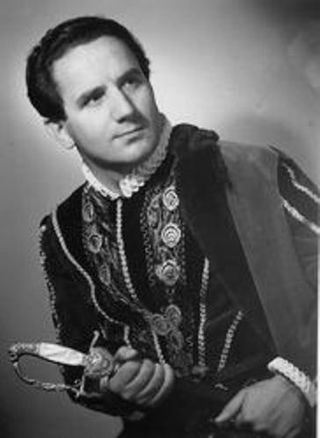
Flaviano Labò was an Italian operatic tenor, particularly associated with heroic roles of the Italian repertory.
Armando Agnini was a successful Italian stage director of opera.

Carlo Sabajno was an Italian conductor. From 1904 to 1932, he was the Gramophone Company's chief conductor and artistic director in Italy, responsible for some of the earliest full-length opera recordings, most of them with the orchestra of La Scala, Milan and prominent singers there. Particularly outstanding among these are his stately, authoritative late-1920s and early-1930s electrical recordings of Don Pasquale, Traviata, Aida, Otello and Bohème.
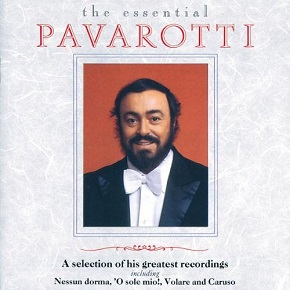
The Essential Pavarotti is an album by tenor Luciano Pavarotti. It was released in 1990 by Decca Records and peaked at number one on the UK Albums Chart, the first ever classical album to do so.
Arthur Cosenza was an American impresario, stage director, and baritone of Italian heritage, who was particularly associated with the New Orleans Opera Association.
Carol Louise Smith was an American contralto who made an international career in opera and concert, and was an academic teacher at the Musikhochschule Zürich and at the Indiana University Bloomington.
Marco Armiliato is an Italian opera conductor.












